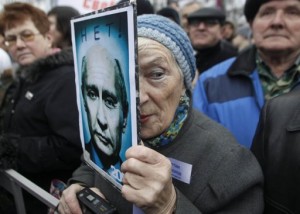By the autumn of 1917, Russia had become, culturally, a free society. The Russian 19th-century prose was intensely read in all culturally advanced countries, Chekhov’s plays were staged, several composers were considered classical, Chaliapin’s voice was admired…
Now, since the autumn of 1917, Lenin, who was only for a short time in power, and Stalin, who died in 1953, staged a pogrom of the Russian culture of genius, since they both feared the cultural efflorescence of genius, endangering their cultural nonentity.

The other day someone placed a copy of the New York Times at our door. I am not in the habit of reading this paper. But once in my hands, I thought I’d give it a glance.
“Tens of Thousands Protest in Moscow, Russia, in Defiance of Putin” by Ellen Barry, an article in the section “Europe,” caught my attention. The legend to the illustration reads: In the largest anti-Kremlin protest since the early 1990s, tens of thousands of Russians rallied in central Moscow on Saturday [Dec. 10, 2011]. Then follows a detailed account of the recent events in Moscow.
“United Russia is a Party of Crooks and Thieves!” and “Russia without Putin!” were resounding cries from the protesters. The author goes on to say: “The demonstration marked what opposition leaders hope will be a watershed moment, ending years of quiet acceptance of the political consolidation Mr. Putin introduced …”
Thousands of people held the largest anti-government protests that post-Soviet Russia has seen to criticize electoral fraud and demand an end to Putin’s rule. The government calculated that it had no choice but to allow the events to unfold and therefore granted a license. There was a large police presence, including helicopters, troop carriers, dump trucks and bulldozers. Police, however, showed surprising patience, and state-controlled TV gave the nationwide demonstrations unexpected airtime.
Despite the fact that international observers reported widespread voting irregularities and that Putin’s party, United Russia, lost a substantial share of its seats, it still retains a majority in the Russian parliament.
Saturday protests were sanctioned by the authorities: Moscow gave permission to people to rally, and police took no action even when the crowd, estimated at over 25,000, far exceeded the projected numbers.
The Russians were protesting against recent parliamentary elections, which domestic and international observers said were tainted by fraud on behalf of Putin’s United Russia as well as Putin’s announcement in September that he would run for president in March of next year.
Similar demonstrations took place in St. Petersburg (7,000 protesters) as well as elsewhere in the country in more than 60 cities.
What surprised me most in this account of the Russian events is the fact that there has been no attempt made on the part of the Western reporters to critically analyze the structure of the present Russian regime. What they fail to understand is that Putin is successfully playing a game at democracy, making Russia look like any other Western country, complete with elections and the freedom to leave the country, the only difference being that, say, their elections are show-casing democracy, concealing behind them Putin’s regime of the firmly entrenched dictatorship, protected by the army and special police squads.
Putin’s regime is a seemingly democratic society. While anyone can leave the country and come back, enjoy one’s vacation anywhere in the world, that is, if one can afford it, and start one’s private business, the Russian people are unarmed, because the Russian constitution does not guarantee them the right to bear arms in order to defend themselves.
Putin was president of Russia from 2000 to 2008, when he had to step aside because of term limits. He is currently prime minister. Six months before the election, Putin revealed his decision to return to the presidency in March of next year, which he is almost certain to win.
But consider this. The Russian army is two-odd million strong, while the OMON (special militia squads) is twice the size of the army: 4 million members plus members of their families loyal to them. That makes up an almost 7-million-strong voting bloc, all of whom are in Putin’s service and will vote for Putin’s party, either out of loyalty to their boss or just following his orders, to ensure Putin’s victory in the next March six-term presidential elections.
Lev Navrozov can be reached by e-mail at levnavrozov@gmail.com.


You must be logged in to post a comment Login